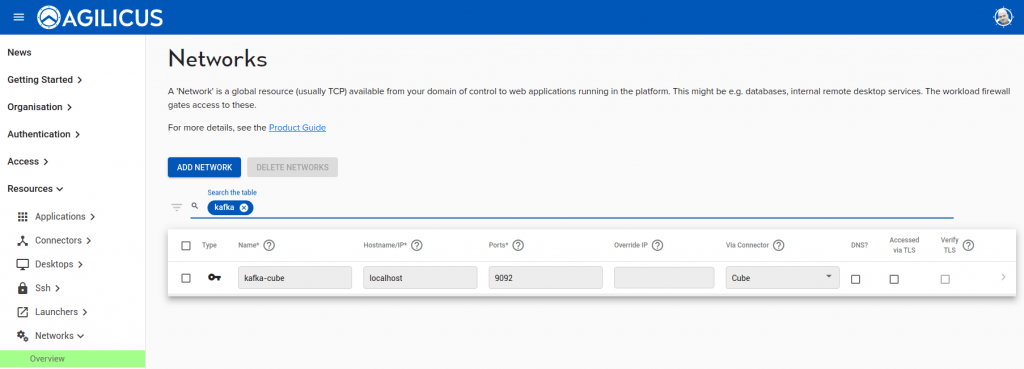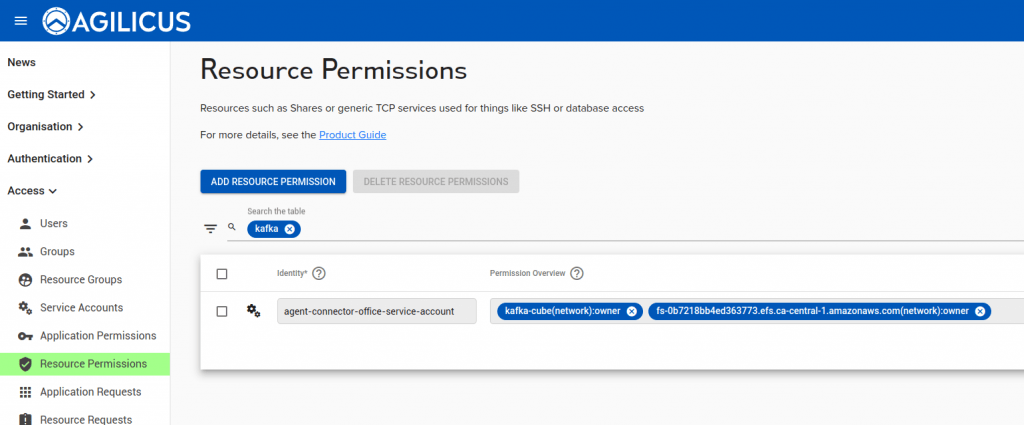Kafka Messaging From AWS VPC To Private Network
Sample Setup
Kafka is a messaging bus using TCP as its underpinnings. It may be desirable to run a Kafka broker inside a private cloud environment (e.g. an AWS VPC) and connect to that broker from a remote private network. Likewise it can be desirable to run a Kafka broker inside a remote private network and connect as a client from a remote private cloud such as AWS VPC. These instructions work equally for each case.
Overview
Kafka is a messaging bus using TCP as its underpinnings. It may be desirable to run a Kafka broker inside a private cloud environment (e.g. an AWS VPC) and connect to that broker from a remote private network. Likewise it can be desirable to run a Kafka broker inside a remote private network and connect as a client from a remote private cloud such as AWS VPC. These instructions work equally for each case.

For this example, we will use two hosts. Cube exists inside a private network with a restrictive firewall. Only HTTPS/443 is allowed, and only in the outbound direction. On this host runs a Kafka broker on port 9092.
Office runs inside a Virtual Private Cloud. It two has outbound-only access: no inbound, no public IP.
For the sake of this example, we will use docker-compose to bring up the Broker on Cube. We will then use kafkacat to send and receive traffic via the broker.
Steps (Cube):
- docker-compose up
- apt-get install kafkacat
- Install Agilicus Connector
- Create a Network Service called
kafka-cube, on port 9092, localhost (or the IP of the docker container if you prefer). - Run
kafkacat -C -b localhost:9092 -t testwhich will sit and listen for messages
Steps (Office):
- Install Agilicus Connector
- Create Service Forwarder, source-connector == Office, Destination-network == kafka-cube, source-ip localhost, source-port 9092
- Assign permissions to Service Forwarder to office connector service-account
- apt-get install kafkacat
- run
echo foo | kafkacat -P -b localhost:9092 -t test
At this stage you should observe the kafkacat on cube wake up and say foo. We are done.
You may now wish to try e.g. change the server-forwarder to listen on 127.0.10.1:9092, THen we can run echo foo | kafkacat -P -b 127.0.10.1:9092 -t test. We can then add an entry to /etc/hosts and call it ‘Cube’ and repeat with a hostname.
docker-compose.yml
version: '2'
services:
zookeeper:
build: ./zookeeper
ports:
- "2181:2181"
kafka:
build: ./kafka
ports:
- "9092:9092"zookeeper/Dockerfile
FROM ubuntu:22.04
EXPOSE 2181
RUN : \
&& apt-get update \
&& apt-get install -y wget vim net-tools default-jre curl
WORKDIR /opt
RUN : \
&& curl -sSL https://dlcdn.apache.org/zookeeper/zookeeper-3.8.0/apache-zookeeper-3.8.0-bin.tar.gz > /tmp/apache-zookeeper-3.8.0-bin.tar.gz \
&& tar xvzf /tmp/apache-zookeeper-3.8.0-bin.tar.gz \
&& rm -f /tmp/apa*gz \
&& cp apache-zookeeper-3.8.0-bin/conf/zoo_sample.cfg apache-zookeeper-3.8.0-bin/conf/zoo.cfg
ENTRYPOINT apache-zookeeper-3.8.0-bin/bin/zkServer.sh start-foregroundkafka/Dockerfile
FROM ubuntu:22.04
EXPOSE 9020
RUN : \
&& apt-get update \
&& apt-get install -y wget vim net-tools default-jre curl
WORKDIR /opt
RUN : \
&& curl -sSL https://downloads.apache.org/kafka/3.2.1/kafka_2.12-3.2.1.tgz > /tmp/kafka_2.12-3.2.1.tgz \
&& tar xvzf /tmp/kafka_2.12-3.2.1.tgz \
&& rm -f /tmp/*tgz
COPY server.properties /opt/kafka_2.12-3.2.1/config/server.properties
ENTRYPOINT /opt/kafka_2.12-3.2.1/bin/kafka-server-start.sh /opt/kafka_2.12-3.2.1/config/server.propertieskafka/server.properties:
broker.id=0
num.network.threads=3
num.io.threads=8
socket.send.buffer.bytes=102400
socket.receive.buffer.bytes=102400
socket.request.max.bytes=104857600
log.dirs=/tmp/kafka-logs
num.partitions=1
num.recovery.threads.per.data.dir=1
transaction.state.log.replication.factor=1
transaction.state.log.min.isr=1
log.retention.hours=168
log.segment.bytes=1073741824
log.retention.check.interval.ms=300000
zookeeper.connect=zookeeper:2181
zookeeper.connection.timeout.ms=6000
group.initial.rebalance.delay.ms=0
offsets.topic.replication.factor=1
ssl.endpoint.identification.algorithm=
advertised.listeners=PLAINTEXT://localhost:9092
listeners=PLAINTEXT://0.0.0.0:9092Want Assistance?
The Agilicus team is here for you. The ‘Chat‘ icon in the lower left, here, or in the administrative web page, goes to our team.
Or, feel free to email support@agilicus.com
Not yet a customer? The TRY NOW button will walk you through the process.


